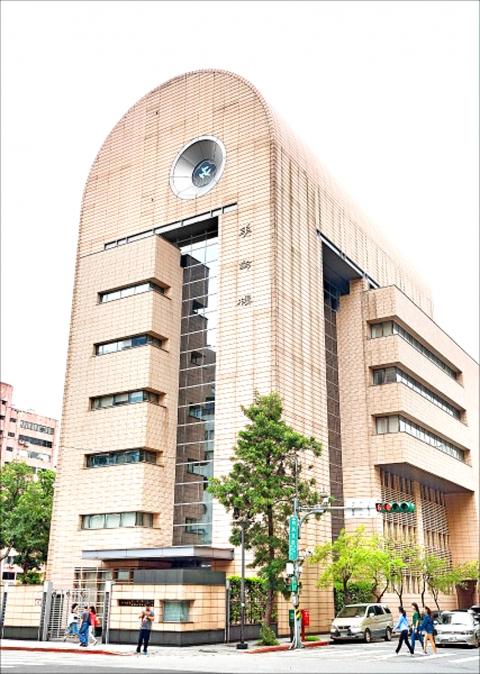The Chinese Nationalist Party (KMT) remained the nation’s richest political party last year with NT$18.1 billion (US$595.06 million) in reported assets, despite posting losses totaling NT$800 million since 2015, its financial statements to the Ministry of the Interior show.
Last year, the KMT posted an income of NT$1.48 billion and expenditures of NT$2.07 billion, its financial disclosures show.
Since 2006, political parties and organizations have been obliged to disclose their financial statements to the ministry in accordance with the Guidelines for the Financial Declarations of Political Parties and Political Organizations.

Photo: Cheng Hung-ta, Taipei Times
The financial declarations are considered public information and the reports are to be made available later this month on the ministry’s Web site.
The KMT’s assets continue to dwarf those of the nation’s other major parties, including the Democratic Progressive Party, which had a reported worth of NT$700 million last year, recording NT$800 million in income and NT$510 million in expenditures, its statements show.
The New Power Party (NPP), founded in early 2015, last year had a net worth of more than NT$20 million, with an income of NT$46 million and expenditures of NT$34 million, its statements show.
The KMT declared its holdings under the party-owned Central Investment Co Ltd (中央投資公司) and Hsinyutai Co Ltd (欣裕台), which were last year declared illicit assets by the Ill-gotten Party Assets Settlement Committee.
Central Investments and Hsinyutai last year had combined assets of NT$15.2 billion, NT$400 million less than 2015’s figures, the statements show.
The KMT also declared NT$100 million in real estate and land, NT$3 million less than the previous year.
In addition, the KMT registered NT$93 million in “current liabilities,” or debts it had to pay within 12 months, the statements show.
The liabilities were comprised of NT$90 million and NT$3 million in private loans that the KMT had borrowed from former chairwoman Hung Hsiu-chu (洪秀柱) and Vice Chairman Jason Hu (胡志強), which had been paid in full by auditing time.
The KMT’s estimated NT$2.07 billion in expenditures included more than NT$1 billion in personnel costs, NT$800 million in operational expenses and NT$162.36 million in outbound political donations and others.
The party’s NT$1.48 billion in revenue was mainly from income gained in trust funds which made up an estimated NT$956 million, or 64.65 percent of the total, it said.
The KMT also received NT$278 million in political subsidies, NT$122 million in political contributions, NT$116 million in membership dues and other sources, the statements showed.
Meanwhile, the financial statements of the National Women’s League indicate that the organization last year had assets worth NT$38.4 billion, including 13 parcels of real estate and NT$240 million in returns on investments.
The league’s financial disclosure forms to the government showed that its actual holdings in May last year exceeded the sum it claimed in February by NT$300 million.
At the time, the league told local media outlets that it had NT$38.1 billion in net worth, NT$2.8 billion of which was to be donated
Its financial statements showed that the league increased its holdings by NT$1.7 billion from May last year through May this year.

The US government has signed defense cooperation agreements with Japan and the Philippines to boost the deterrence capabilities of countries in the first island chain, a report by the National Security Bureau (NSB) showed. The main countries on the first island chain include the two nations and Taiwan. The bureau is to present the report at a meeting of the legislature’s Foreign Affairs and National Defense Committee tomorrow. The US military has deployed Typhon missile systems to Japan’s Yamaguchi Prefecture and Zambales province in the Philippines during their joint military exercises. It has also installed NMESIS anti-ship systems in Japan’s Okinawa

‘WIN-WIN’: The Philippines, and central and eastern European countries are important potential drone cooperation partners, Minister of Foreign Affairs Lin Chia-lung said Minister of Foreign Affairs Lin Chia-lung (林佳龍) in an interview published yesterday confirmed that there are joint ventures between Taiwan and Poland in the drone industry. Lin made the remark in an exclusive interview with the Chinese-language Liberty Times (the Taipei Times’ sister paper). The government-backed Taiwan Excellence Drone International Business Opportunities Alliance and the Polish Chamber of Unmanned Systems on Wednesday last week signed a memorandum of understanding in Poland to develop a “non-China” supply chain for drones and work together on key technologies. Asked if Taiwan prioritized Poland among central and eastern European countries in drone collaboration, Lin

Renewed border fighting between Thailand and Cambodia showed no signs of abating yesterday, leaving hundreds of thousands of displaced people in both countries living in strained conditions as more flooded into temporary shelters. Reporters on the Thai side of the border heard sounds of outgoing, indirect fire yesterday. About 400,000 people have been evacuated from affected areas in Thailand and about 700 schools closed while fighting was ongoing in four border provinces, said Thai Rear Admiral Surasant Kongsiri, a spokesman for the military. Cambodia evacuated more than 127,000 villagers and closed hundreds of schools, the Thai Ministry of Defense said. Thailand’s military announced that

CABINET APPROVAL: People seeking assisted reproduction must be assessed to determine whether they would be adequate parents, the planned changes say Proposed amendments to the Assisted Reproduction Act (人工生殖法) advanced yesterday by the Executive Yuan would grant married lesbian couples and single women access to legal assisted reproductive services. The proposed revisions are “based on the fundamental principle of respecting women’s reproductive autonomy,” Cabinet spokesperson Michelle Lee (李慧芝) quoted Vice Premier Cheng Li-chiun (鄭麗君), who presided over a Cabinet meeting earlier yesterday, as saying at the briefing. The draft amendment would be submitted to the legislature for review. The Ministry of Health and Welfare, which proposed the amendments, said that experts on children’s rights, gender equality, law and medicine attended cross-disciplinary meetings, adding that